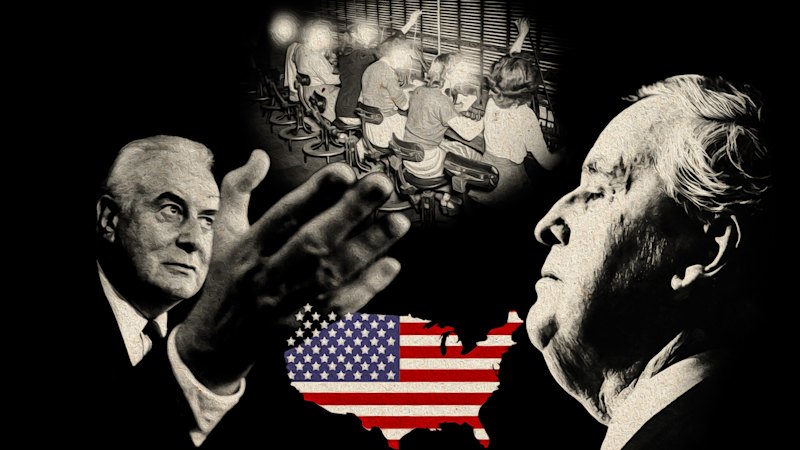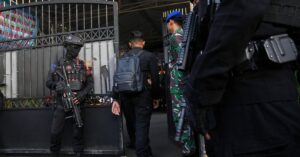
Barry Nash recalls a moment etched in his memory forever. “I vividly recall the look of absolute horror on Mum’s face and the heated discussion that followed,” he says. This moment marked the beginning of a secret that the Nash family would keep for 50 years, a secret that intertwined with the political upheaval of Australia in the 1970s.
In the days following the initial shock, Winn Nash, Barry’s mother, informed her family of two more phone calls from Marshall Green to Queensland Premier Joh Bjelke-Petersen. “One could safely surmise that Green was ensuring Bjelke-Petersen would continue his role in bringing about the downfall of the Whitlam government,” Barry reflects.
The Intriguing Phone Calls
Adding to the family’s anxiety was another phone call to Bjelke-Petersen, overheard by Winn Nash. The caller was Wiley Fancher, a right-wing American living in Queensland, calling from Zurich. Barry recalls his mother’s agitation upon returning home that night. “She mentioned overhearing Fancher and Bjelke-Petersen discussing the Whitlam government. I didn’t realize the historical significance until later.”
In December 1975, Labor frontbencher Tom Burns described Fancher in the Queensland parliament as a “shady financial dealer” and a friend of Bjelke-Petersen. Allegations surfaced in federal parliament the following year, suggesting Bjelke-Petersen had sent Fancher to Europe to find compromising material on the Whitlam government’s loan raising.
The Political Landscape
On July 30, Green’s ambassadorship in Australia ended, and he returned to Washington. By September, Bjelke-Petersen’s nomination to fill the Milliner vacancy, Albert Field, was sworn in as the new independent senator for Queensland. Field, a former ALP member, opposed Whitlam’s progressive agenda.
Whitlam’s fragile hold on the Senate was weaponized against him. On October 15, 1975, the Loans Affair engulfed the government, leading to Malcolm Fraser’s justification for blocking the budget in the Senate. With Field absent due to an ALP legal challenge, the opposition motion to block supply passed 30-29. Senator Hall criticized the Coalition’s move, stating, “Let it be remembered that the opposition succeeded only because a Labor senator died.”
“It was like being on the Titanic knowing that you’re going to hit an iceberg and not being able to do or say anything about what was coming,” Barry Nash reflects.
The Dismissal and Its Aftermath
On November 11, 1975, Governor-General Sir John Kerr dismissed the Whitlam government, a move that shocked the nation. Helen Nash recalls the news hitting her mother like a “body blow.” Barry remembers his father’s anger, “He said to me, ‘They’ve orchestrated another coup,’ referring to Kerr, Fraser, Bjelke-Petersen, the Murdoch press, and the US and UK administrations.”
Speculation about CIA involvement in the dismissal began almost immediately. In 1988, Green denied any US intelligence role, stating, “Our people weren’t operating behind your back.” However, declassified documents revealed Washington’s antipathy towards the Whitlam government and an early recognition that Senate defeat could lead to a government change.
Expert Opinions and Historical Context
Historian Professor James Curran noted that in October 1974, Green predicted to the British high commissioner that the government would fall within six to 12 months. A month later, media mogul Rupert Murdoch briefed Green on a meeting with Kerr, discussing potential supply issues if Whitlam’s Senate hold weakened.
Retired academic Stephen Stockwell, who recently published a book on the Whitlam dismissal, finds the Nash family’s revelations unsurprising. “While the Nash family’s information is hearsay, it is compelling historical evidence of US overreach,” Stockwell comments.
“The United States was very concerned about losing control of the Pine Gap base, their only means of bringing down information from a classified military satellite,” Stockwell explains.
Barry Nash is certain from his mother’s accounts that “Marshall Green was 100 percent involved in instigating the process to have Gough Whitlam dismissed.” He describes his mother’s burden as harboring “the nation’s biggest secret.”
Legacy and Reflection
In July 1977, Warren Christopher, Deputy Secretary of State under President Jimmy Carter, met with Whitlam, then opposition leader. Christopher conveyed Carter’s respect for Australia’s democratic rights, promising no further US interference.
Stockwell sees this as an implicit apology for American interference. In a 1977 referendum, Australia voted to ensure Senate vacancies were filled by the same political party, reflecting a desire to prevent future political manipulation.
Win Nash retired in 1990, receiving a medallion for her service. Despite her contributions, she wished she could have done more. The Nash family’s secret, now revealed, offers a poignant glimpse into a turbulent chapter of Australian history.







